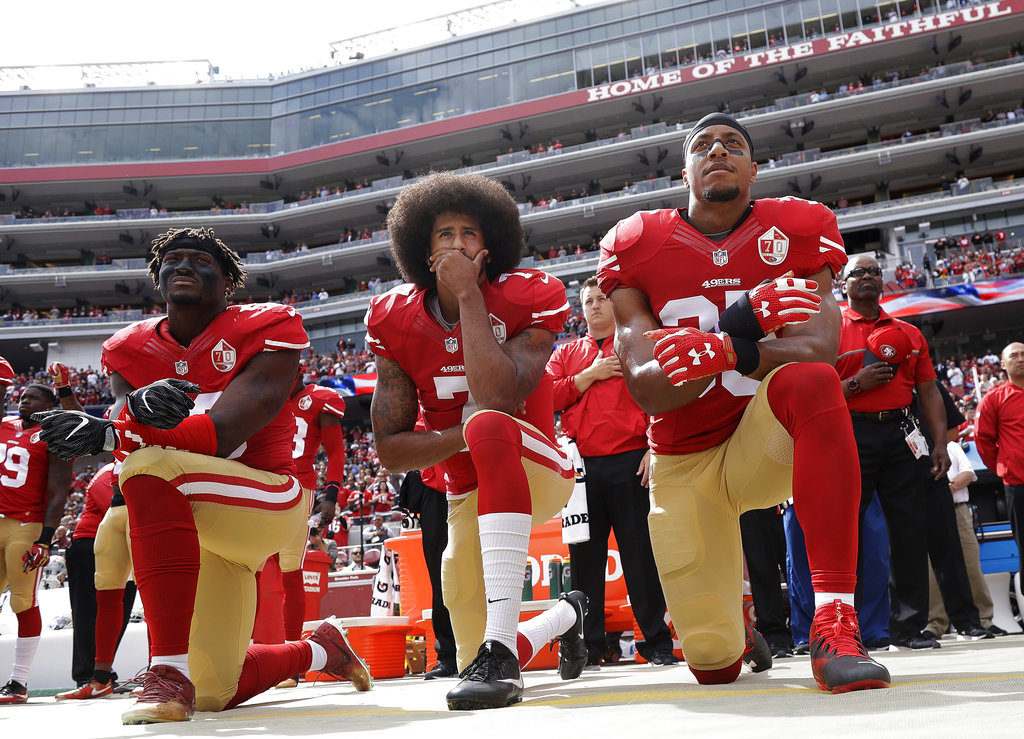National anthem will be hot topic at NFL owners meetings

FILE – In this Oct. 2, 2016, file photo, San Francisco 49ers outside linebacker Eli Harold, left, quarterback Colin Kaepernick, center, and safety Eric Reid kneel during the national anthem before the team’s NFL football game against the Dallas Cowboys in Santa Clara, Calif. Kaepernick accepted Sports Illustrated’s Muhammad Ali Legacy Award from Beyonce on Tuesday night, Dec. 5, 2017, and promised that “with or without the NFL’s platform, I will continue to work for the people.” Beyonce thanked Kaepernick for his “personal sacrifice,” and 2016 Ali Award winner Kareem Abdul-Jabbar called Kaepernick a “worthy recipient” during a video tribute.(AP Photo/Marcio Jose Sanchez, File)
ORLANDO, Fla. — The national anthem is going to be a hot topic at the NFL owners meetings.
Just don’t expect any far-ranging decisions to be made.
Judging by the comments Sunday from the Texans’ Robert McNair and the Jets’ Christopher Johnson, the debate among the 32 owners could be confrontational.
McNair, who last year made an analogy of inmates running the prison about players’ demonstrations during the anthem, remains adamant that everyone should stand for the “The Star-Spangled Banner.”
“Our playing field is not the place for political statements, not the place for religious statements,” McNair said. “It’s the place for football.”
Johnson, acting owner of the Jets with his brother, Woody, serving as ambassador to the United Kingdom, took a far different tack.
“I have immense respect for the players and their efforts,” Christopher Johnson said. “I think if other teams approached it like that, it would not be such a problem in the NFL.
“I can’t speak to how other people run their teams, but I just think that trying to forcibly get the players to shut up is a fantastically bad idea.”
While the social protests players made last season will be a topic here, reaching an agreement on language in the league’s policy regarding behavior during the anthem is highly unlikely. Owners will meet again in May in Atlanta, and with so much other business to attend in the next three days, the anthem issue figures to extend until then.
“I don’t know if it’ll be a vote or just a new policy coming out,” Giants owner John Mara said. “I think we can’t go much beyond the May meeting before coming up with some sort of resolution to that.”
McNair and Cowboys owner Jerry Jones are among the leaders of the move to ban any demonstrations during the anthem. McNair drew strong criticism from a variety of players after making his “inmates” comment last fall.
“We’re going to deal with it in such a way, I think, that people will understand that we want everybody to respect our country, respect our flag,” McNair said Sunday. “And our playing fields, that’s not the place for political statements.
“Fans are upset about it. The fans are our customers. You can replace the owners and the league would survive. You can replace the players, although the game won’t be as good. You can’t replace the fans. If you don’t have the fans, you’re dead.”
Johnson was more willing to search for answers to the anthem issue while also not wanting the players’ messages to be lost. He doesn’t favor seeing the policy changed to having the players remain in the locker room until after the anthem is played, which has been discussed.
“I think that’s a particularly bad idea,” Johnson said.
What about changing the language to the players must stand?
“I don’t agree with that either, but I’m only one of 32 owners,” he added. “I think that the Jets had a pretty great thing happen last year around the anthem. I think there was an understanding between me and the players that we could use our position – rightly or wrongly, people pay attention to teams and athletes – but we could use our position to get some great stuff done off the field. I think we have done some great things off the field.”
Another off-field topic is the sale of the Carolina Panthers. Jerry Richardson announced in December that he was selling following allegations of workplace misconduct.
“He’s going to sell the team,” McNair said of the 81-year-old Richardson. “He’s had all kinds of health problems. … I don’t know all the details, but I know he has some good prospective buyers that appear to be qualified.”
As for investigations into Richardson’s behavior, McNair defended his fellow owner, also citing instances when the Texans faced similar accusations.
“I understand what he’s saying,” McNair said. “Sometimes people choose to try to make something go away rather than fighting. I think his regret is he didn’t fight some of these things.
“We got confronted with it, too, where people will allege something, they get a lawyer, and what they do is come out and threaten you. And your legal counsel and your insurance people say, ‘Well, it’s going to cost you X number millions of dollars’ to defend this. And if we can settle it for this.′
“Well, wait a minute. We’re not guilty. Why would we do that?′ That’s the question. Sometimes just to get rid of it, if you can get rid of it, (you) — do it.”